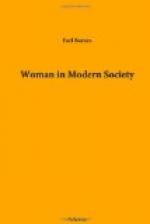In selecting men, the citizen must be able to recognize general ability and intellectual fitness. It is at this point that modern democracies are most apt to go wrong. The standards by which we measure men and women are most imperfect; and we are prone to let one good or bad quality overshadow all others. Thus in an extended study on school children’s attitude toward Queen Victoria in England, and toward President McKinley in America, made while these rulers were alive, we found that less than twenty per cent. mentioned any kind of political ability, nor did they often mention their general ability, nor their honesty. They admired them primarily because they were “good and kind.” In other words the school children of these two lands approve their rulers because, in a vague general way, they like them.[43] The significance of the study lies in the fact that in all democracies a large number of the voters live on an intellectual plane represented by these school children.
[43] EARL BARNES, Studies in Education, Vol. II, pp. 5-80. Philadelphia, 1902.
This conclusion is borne out by the judgment of Miss Jane Addams who, writing of foreign voters about Hull House, says: “The desire of the Italian and Polish and Hungarian voters in an American city to be represented by ‘a good man’ is not a whit less strenuous than that of the best native stock. Only their idea of the good man is somewhat different. He must be good according to their highest standard of goodness. He must be kind to the poor, not only in a general way, but with particular and unfailing attention to their every want and misfortune. Their joys he must brighten and their sorrows he must alleviate. In emergency, in catastrophe, in misunderstanding with employers and with the law, he must be their strong tower of help. Let him in all these things fill up their ideal of the ‘good man’ and he has their votes at his absolute disposal."[44]
[44] JANE ADDAMS, Democracy, p. 221. New York: The Macmillan Co., 1902.
To be a safe citizen one must be able to go beyond this kindly feeling and ask, Does the candidate know enough to do what I want done? Has he the honesty to resist the temptation to exploit me? Has he the leadership to command the best efforts of the subordinates in his department? Has he serious defects that may cause his failure? Is he an opportune man for the time and place?
This selection is made very difficult to-day by the misrepresentation of interested individuals and political parties; and especially by the reports in the press, which seek to discredit candidates they oppose, and to gloss over or deny defects in their chosen leaders. Thus the whole public atmosphere in the midst of a campaign is intended to confuse and bewilder the citizen who is honestly seeking the best candidate. Only ripened intelligence, experience with men and women, and ability to judge conflicting evidence, can enable the voter to select wisely.




